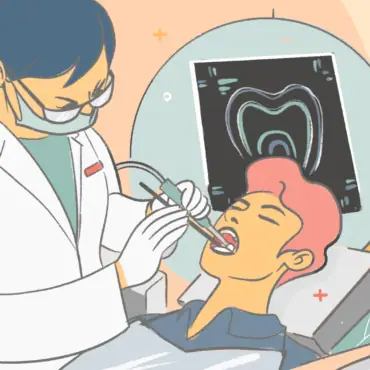How many times did you brush your teeth yesterday? If you don’t answer two times, then you’re putting your oral health at risk. Brushing teeth is just one of the ways to maintain healthier teeth and gums. This helps you preserve the well-being of your teeth, reduces the risk of gum disease, and lets you keep your teeth for longer.
While brushing helps, it shouldn’t be the only factor used to keep your teeth cleaning. Frequently checking in with a dentist appointment can help to keep your teeth sparkling clean and help you maintain a brighter smile.
A deep cleaning is recommended to help remove tartar and germs that a regular toothbrush can’t reach. Let’s take a closer look at why you should be going for a deep clean regularly. Plus, we’ll consider how to get a cleaning for a lower price.
What is a dental deep cleaning?
A deep dental cleaning also goes by other names. Many dentists will refer to the procedure as scaling and root planing. This is a procedure that is often used in people with gum disease. This is a very common procedure that dentists perform.
There are different types of deep cleaning procedures that can be used:
- Preventative deep cleaning focuses on helping to reduce the risk of experiencing gum disease in the future. It can be used among patients with existing periodontal disease. The use of the procedure may help reduce complications too. In some cases, this is the only type of treatment required by the patient to treat gum disease.
- Therapeutic deep cleaning is a bit more invasive than the preventative type. It’s performed on people with existing gum disease. In such a case, there is existing inflammation in the gums. The gums may also bleed and feel inflamed or warm.
During the dental cleaning procedure, a doctor will focus on cleaning the areas of the mouth that regular brushing cannot reach. This involves the insertion of a thin tool between the gums and the teeth. The dentist will also clean the areas between teeth, as these are often also missed during brushing.
What’s the difference between a regular cleaning and a deep Cleaning?
Regular cleaning generally involves a non-invasive procedure where the surface of the teeth area is cleaned. With a deep cleaning, however, the process becomes more invasive. How invasive the procedure depends on the state of your teeth. When you already have periodontal disease and a significant level of inflammation, the procedure may be a bit more invasive.
Due for a checkup?
Find a top rated dentist near you that takes your insurance.
Who should get a deep Cleaning?
Patients with gum disease are the primary candidates for a deep clean. In a majority of cases, patients who are provided a deep clean haven’t had an appointment with a dentist for a while.
Calculus, plaque, and bacteria tend to accumulate around the teeth. When these are not removed from a regular cleaning session, the buildup starts to migrate. Eventually, the plaque and calculus move below your gumline. At this point, more bacteria start to accumulate on your teeth.
This process can result in an infection. The infection can sometimes become more serious, causing you to experience bone tissue loss. At this point, a deep cleaning is needed. A regular cleaning provided by a dentist will not be able to reach deep enough to clean out your gum line.
There are a few symptoms that may signal a need for deep cleaning. It is important you look out for these symptoms and take action before complications develop. As the gum disease continues to worsen, more serious problems can develop later on.
Common signs you may need to undergo a deep cleaning procedure:
- Your gums bleed easily, such as when brushing or biting into certain fruit.
- Your gums feel tender. They may also be red and look swollen.
- There are cases where the gums start to pull away from your teeth.
- You may have an unpleasant taste in your mouth. It may only go away temporarily after brushing your teeth.
- Teeth may separate when you develop gum disease. Some people also find that their teeth become loose.
- If you wear dentures, the fitting may gradually become altered.
Deep cleaning procedure
A deep clean is a multi-step procedure that needs to be followed. The dentist will first have a consultation with you. They need to examine your mouth in order to see the condition. A dentist can provide you with details on your current oral health and the well-being of your gums. They will then recommend the appropriate treatment.
During the deep cleaning procedure, you are sometimes given an anaesthetic. The first step is then the scaling part. Following this, root planing is done in order to further help in the cleaning and structuring of your teeth.
You will likely get a prescription for antibiotics as a way of reducing the risk of infection. Sometimes, the dentist refers you to a periodontist to provide further assistance.
Is deep cleaning really necessary?
Some people are able to maintain their oral hygiene by simply going for a standard professional dental cleaning once a year. Others, however, may require a more invasive procedure to help remove calculus, plaque, and other particles that are stuck beneath the gum line.
It is always important to speak to a dentist to determine if this is an appropriate procedure. The dentist will examine your mouth and tell you whether a deep cleaning is needed.
You should be getting regular cleanings at least twice a year to maintain good health. If not, your dental work will cost you more as time progresses.
Is it painful to get a dental deep cleaning?
Many people fear going to the dentist. One of the most common concerns involves experiencing pain during a procedure. A deep cleaning is more invasive than a regular dental cleaning, which means it can hurt.
The good news is that most dentists will use an anaesthetic on the patient before starting with this procedure. The anaesthetic will help ensure you feel less (or no) pain while the dentist performs the procedure.
There is a chance of feeling slight discomfort after the procedure, but only once the anaesthetic starts to wear off. If you do feel discomfort, note that it is just temporary and will get better soon.
Are there any risks or disadvantages to getting a deep cleaning?
There is a minimal risk of infection associated with deep cleaning, which mostly applies to people who have a condition that puts them at risk of infections. Always tell your dentist about any medical conditions you have before undergoing this procedure.
How much does it cost to get a deep cleaning?
Pricing for the procedure depends on where you go and what’s needed. This cleaning may be covered by your insurance, most plans cover 80%. Scaling and root planing will often cost more than $200. Periodontal treatment will cost more, compared to a preventative option.
This is why dentists advise patients to visit them regularly and get their teeth cleaned. Average prices range from $200 to $300 in the US. If the procedure is done for medical reasons, it may be covered by certain medical insurance programs.
How can I get a less expensive dental deep cleaning?
Patients who have a medical plan might be able to get a significant discount on the cost of a deep clean. It is important you look at the benefits you get with your medical plan. This can help you understand if it is possible to undergo the procedure with only a minimal contribution from your side.
Not sure what your insurance might cover? Check out our full breakdown here.
We reward you for going to your dental checkup!
Conclusion
A regular checkup with a dentist can help prevent tooth loss and gum disease. Deep cleaning of your teeth will be recommended regularly too. This procedure removes plaque and tartar from your teeth. It also gets rid of germs that are buried between your teeth and gums. With this procedure performed at the appropriate intervals, you will find it helps you keep your teeth for longer too. Find a test and make an appointment to ensure you lower your risk of periodontal disease, tooth loss, and other complications that may develop when you fail to obtain a dental cleaning.








